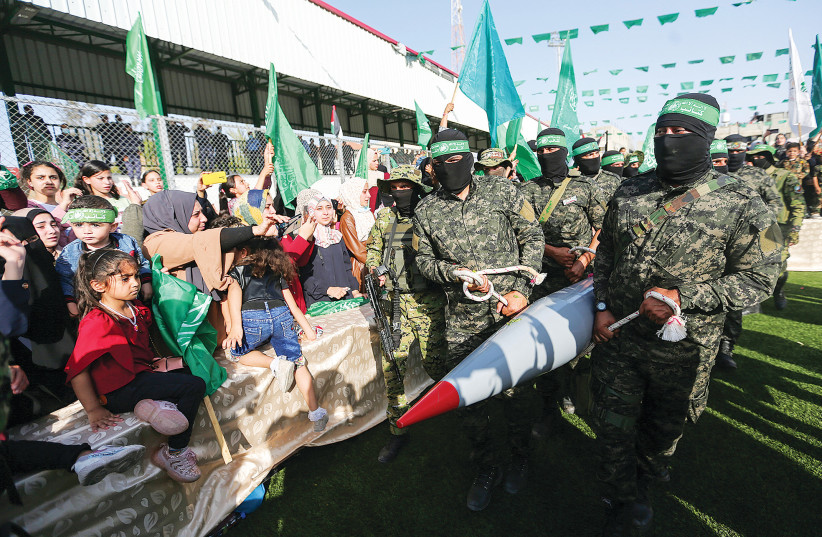Representatives of six Palestinian factions, including Fatah and Hamas, are expected to hold talks in Algeria later this week on ways of achieving “national reconciliation.”
The intra-Palestinian talks will be held under the auspices of Algerian President Abdelmajid Tebboune, who recently invited the factions to Algeria.
In addition to Fatah and Hamas, representatives of the Popular Front for the Liberation of Palestine (PFLP), Democratic Front for the Liberation of Palestine (DFLP), Popular Front-General Command (PFLP-GC) and Palestinian Islamic Jihad (PIJ) are also expected to participate in the discussions.
The Fatah delegation is headed by Azzam al-Ahmed, a member of the Fatah Central Committee, while the Hamas team is led by Khalil al-Hayya, a member of the group’s politburo.
Previous attempts by Saudi Arabia, Yemen, Egypt and Qatar to achieve Palestinian “national reconciliation” have been unsuccessful. A number of reconciliation agreements signed between Fatah and Hamas since 2007 have also failed to materialize.

Palestinian sources ruled out the possibility that the discussions in Algeria would achieve a breakthrough. The gap between Fatah and Hamas remains as wide as ever, they said.
Tensions between Fatah and Hamas escalated after Palestinian Authority President Mahmoud Abbas’s decision last year to call off the presidential and parliamentary elections, which were supposed to take place on May 22 and July 30, respectively.
The tensions have since increased in the wake of a security crackdown waged by the PA security forces against Hamas members in the West Bank and the PA leadership’s renewed contacts with Israel, as well as ongoing security coordination between the Palestinian security forces and the IDF.
“There’s no room for optimism,” said a Ramallah-based political analyst. “The leaders of Fatah and Hamas will again meet and hug each other, but nothing will come out of the talks in Algeria. The two sides are not serious about ending their dispute.”
A Fatah official said he did not expect the talks in Algeria to succeed.
“Hamas is not interested in reconciliation,” he said. “Hamas does not want partnership; it wants to take over the Palestinian Authority with the help of Iran and Qatar.”
On the eve of the discussions in Algeria, Fatah and Hamas leaders again traded accusations, condemning each other for obstructing the “national reconciliation.”
Fatah Secretary-General Jibril Rajoub last week said he had never heard Hamas leader Khaled Mashaal talk about or support a dialogue between the rival factions.
Hamas condemned Rajoub’s remarks, saying he knows very well who is responsible for hindering efforts to end the Fatah-Hamas rivalry and hold general elections.
Hamas accused Rajoub of making “false accusations and distorting the facts” and urged Fatah to abandon its policy of excluding other parties from the decision-making process.
Hamas spokesman Hazem Qassem accused the PA of working with Israel to “foil the resistance program” in the West Bank, a reference to the crackdown targeting Hamas members.
Hamas has repeatedly called on the PA to end security coordination with Israel as a precondition for ending the dispute, which reached its peak in 2007 when the Islamist movement seized control of the Gaza Strip.
Senior Hamas official Ibrahim al-Madhoun said his movement was keen on achieving progress in the talks to end the dispute with Fatah “on the basis of full partnership, agreement on holding general elections and reactivating Palestinian institutions.”
The DFLP on Sunday said it would present an initiative to end the Fatah-Hamas dispute during the talks in Algeria. The initiative calls for ending mutual accusations and arrests of Hamas and Fatah members in the West Bank and Gaza Strip, the DFLP said in a statement.
Additionally, the initiative calls for “partnership and full representation [of Hamas and other factions] in the institutions of the PLO and preparing for presidential and parliamentary elections.”
Hamas, PIJ and the PFLP-GC are not among the 10 members of the PLO.
The three groups have refused to join the PLO, which is dominated by Fatah, unless it undertakes comprehensive reforms and walks away from agreements signed with Israel.
